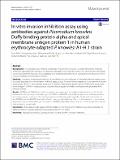Files in this item
In vitro invasion inhibition assay using antibodies against Plasmodium knowlesi Duffy binding protein alpha and apical membrane antigen protein 1 in human erythrocyte-adapted P. knowlesi A1-H.1 strain
Item metadata
| dc.contributor.author | Muh, Fauzi | |
| dc.contributor.author | Lee, Seong-Kyun | |
| dc.contributor.author | Hoque, Mohammad Rafiul | |
| dc.contributor.author | Han, Jin-Hee | |
| dc.contributor.author | Park, Ji-Hoon | |
| dc.contributor.author | Firdaus, Egy Rahman | |
| dc.contributor.author | Moon, Robert W. | |
| dc.contributor.author | Lau, Yee Ling | |
| dc.contributor.author | Han, Eun-Taek | |
| dc.date.accessioned | 2019-07-18T11:30:08Z | |
| dc.date.available | 2019-07-18T11:30:08Z | |
| dc.date.issued | 2018-07-27 | |
| dc.identifier | 259673185 | |
| dc.identifier | b39ef903-81ff-4911-a345-f19b9f363142 | |
| dc.identifier | 000440181600001 | |
| dc.identifier | 85050721633 | |
| dc.identifier.citation | Muh , F , Lee , S-K , Hoque , M R , Han , J-H , Park , J-H , Firdaus , E R , Moon , R W , Lau , Y L & Han , E-T 2018 , ' In vitro invasion inhibition assay using antibodies against Plasmodium knowlesi Duffy binding protein alpha and apical membrane antigen protein 1 in human erythrocyte-adapted P. knowlesi A1-H.1 strain ' , Malaria Journal , vol. 17 , 272 . https://doi.org/10.1186/s12936-018-2420-4 | en |
| dc.identifier.issn | 1475-2875 | |
| dc.identifier.other | ORCID: /0000-0002-3966-9110/work/59698773 | |
| dc.identifier.uri | https://hdl.handle.net/10023/18124 | |
| dc.description.abstract | Background: The rapid process of malaria erythrocyte invasion involves ligand-receptor interactions. Inducing antibodies against specific ligands or receptors that abrogate the invasion process is a key challenge for blood stage vaccine development. However, few candidates were reported and remain to be validated for the discovery of new vaccine candidates in Plasmodium knowlesi. Methods: In order to investigate the efficacy of pre-clinical vaccine candidates in P. knowlesi-infected human cases, this study describes an in vitro invasion inhibition assay, using a P. knowlesi strain adapted to in vitro growth in human erythrocytes, PkA1-H. 1. Recombinant proteins of P. knowlesi Duffy binding protein alpha (PkDBPα) and apical membrane antigen 1 (PkAMA1) were produced in Escherichia coli system and rabbit antibodies were generated from immune animals. Results: PkDBPα and PkAMA1 recombinant proteins were expressed as insoluble and produced as a functional refolded form for this study. Antibodies against PkDBPα and PkAMA1 specifically recognized recombinant proteins and native parasite proteins in schizont-stage parasites on the merozoite organelles. Single and combination of anti-PkDBPα and anti-PkAMA1 antibodies elicited strong growth inhibitory effects on the parasite in concentrationdependent manner. Meanwhile, IgG prevalence of PkDBPα and PkAMA1 were observed in 13.0 and 46.7% in human clinical patients, respectively. Conclusion: These data provide support for the validation of in vitro growth inhibition assay using antibodies of DBPα and AMA1 in human-adapted P. knowlesi parasite PkA1-H. 1 strain. | |
| dc.format.extent | 11 | |
| dc.format.extent | 1761760 | |
| dc.language.iso | eng | |
| dc.relation.ispartof | Malaria Journal | en |
| dc.subject | Plasmodium knowlesi | en |
| dc.subject | Zoonotic malaria | en |
| dc.subject | PkDBP alpha | en |
| dc.subject | PkAMA1 | en |
| dc.subject | Invasion | en |
| dc.subject | Inhibition | en |
| dc.subject | QH301 Biology | en |
| dc.subject | RM Therapeutics. Pharmacology | en |
| dc.subject | NDAS | en |
| dc.subject | SDG 3 - Good Health and Well-being | en |
| dc.subject.lcc | QH301 | en |
| dc.subject.lcc | RM | en |
| dc.title | In vitro invasion inhibition assay using antibodies against Plasmodium knowlesi Duffy binding protein alpha and apical membrane antigen protein 1 in human erythrocyte-adapted P. knowlesi A1-H.1 strain | en |
| dc.type | Journal article | en |
| dc.contributor.institution | University of St Andrews. School of Medicine | en |
| dc.identifier.doi | https://doi.org/10.1186/s12936-018-2420-4 | |
| dc.description.status | Peer reviewed | en |
This item appears in the following Collection(s)
Items in the St Andrews Research Repository are protected by copyright, with all rights reserved, unless otherwise indicated.

